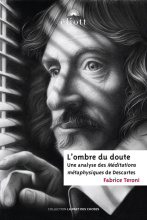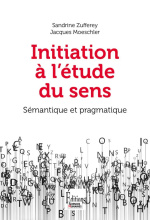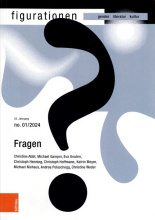Nouveaux livres
-
Publié le
Rêver la littérature mondiale
Jérôme David

-
Publié le
Une formule voyageuse
Magali Bossi

-
Publié le
Out of Nowhere. The Emergence of Spacetime in Theories of Quantum Gravity
Christian Wüthrich et Nick Huggett

-
Publié le
The Uncertain World of Renaissance Geneva and Savoy
Mathieu Caesar

-
Publié le
Éphémères, ordinaires, populaires ?
Sous la direction de Luana Bermúdez, Thalia Brero, Constance Carta et Belinda Palacios

-
Publié le
Les langues nationales dans l’enseignement des langues en Suisse
Daniel Elmiger

-
Publié le
La source et le signe. Anthropologie, littérature et parole indigène
Vincent Debaene

-
Publié le
L'Arioste (Sonnets)
Frédéric Tinguely

-
Publié le
L'ombre du doute
Fabrice Teroni

-
Publié le
An International Anomaly. Colonial Accession to the League of Nations
Thomas Gidney

-
Publié le
Initiation à l'étude du sens
Sandrine Zufferey et Jacques Moeschler

-
Publié le
Reflexion & Illumination
Edité par René Wetzel, Robert Gisselbaek et Katharina Gedigk

-
Publié le
Cantonophonie. Sur l’origine des noms des cantons suisses
Michiel de Vaan

-
Publié le
Magie naturelle et libre pensée
Andrien Mangili

-
Publié le
The Logic of Grounding
Fabrice Correia

-
Publié le
Bronislaw Baczko, 1924-2024, Abécédaire
Edité par Michel Porret et François Rosset

-
Publié le
Fragen
Christine Abbt et Christine Weder (éditrices)

-
Publié le
Sprachgeschichte der frühen Frauenbewegungen - Von den Anfängen bis zum Ersten Weltkrieg
Juliane Schröter et Constanze Spiess (Issue Editors)

-
Publié le
Céramique en contextes. Érétrie au tournant des époques archaïque et classique
Tamara Saggini

-
Publié le
Usages des mots, usages des choses. Quatre études sur la littérature et les artefacts
Lorenz E. Baumer / Manuel Royo (éds)

-
Publié le
Lupae. Présences féminines autour de Romulus et Rémus
Francesca Prescendi

-
Publié le
Paroles spoliées. Itinéraires de la littérature orale
Sous la direction d'Irene Albers et Eléonore Devevey

-
Publié le
Calvino nella nebbia. Dubitare, esitare, cancellare
Margherita Parigini

-
Publié le
Albert Cohen et Genève. Guide littéraire
Pierre-Louis Chantre, Marie-Luce Desgrandchamps, Idit Ezrati Lintz, Thierry Maurice, Bruno Racalbuto, Noémie Sakkal Miville, Yan Schubert

-
Publié le
Le livre du gouvernement des roys et des princes di Henri de Gauchy
Gavino Scala

-
Publié le
The Performance of Balaĝ and Eršema Prayers in the Late First Millennium BC
Sam Mirelman

-
Publié le
Theories of Colour from Democritus to Descartes
Edité par Véronique Decaix et Katerina Ierodiakonou

-
Publié le
Disturbed Faces – Visages perturbés
Sous la direction d'Evelyn Dueck et de Guillemette Bolens

-
Publié le
L'art contemporain. Une infographie.
Béatrice Joyeux-Prunel, Guillemette Crozet

-
Publié le
Réformatrices
Edité par Sarah Scholl et Daniela Solfaroli Camillocci

